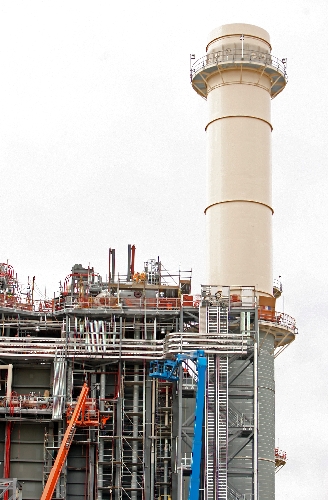484-megawatt power plant touted for energy efficiency
NV Energy officials say a new energy-efficient power plant will pay dividends for ratepayers over the long term, though the state's consumer advocate balked at the plant's price tag.
The utility is set to unveil today the 484-megawatt addition to its Harry Allen Generating Station in Apex, just north of Las Vegas. The natural gas-powered expansion uses a combined-cycle generating technique that produces more power with less fuel.
Here's how it works: In the first generating cycle, natural gas flows through two jet-engine turbines to drive the electric generator. As exhaust heat leaves the turbines, it's captured in a heat recovery steam generator, which then creates a second round of power.
Michael Yackira, president and chief executive officer of NV Energy, likened the plant to "buying a car that gets more miles-per-gallon."
"The emission rates for the new facility are among the lowest in the industry, and the amount of electricity generated for a specific amount of natural gas fuel will be among the best in the nation."
The Harry Allen Generating Station, named for a former company executive, is also a milestone in NV Energy's strategy to build its own generating capacity.
As recently as 2005, the utility owned less than 40 percent of its generation. That lack of company-owned power plants made the utility vulnerable to price spikes during peak electricity use, when it would buy juice on wholesale power markets to meet surging demand.
With the completion of Harry Allen, NV Energy owns nearly 80 percent of the generation necessary to meet Southern Nevada's power needs.
"We're more energy-independent as a result of this plant. We don't have to count on others to produce electricity," Yackira said.
State consumer advocate Eric Witkoski, who's tasked with representing ratepayers in utility rate cases, discounted NV Energy's drive toward energy independence. The company must still buy natural gas to fuel its power plants, he said.
Plus, NV Energy will ask to recoup a big share of the plant's cost in the general rate case it files with the Public Utilities Commission of Nevada on June 1. Rates included in the filing would take effect Jan. 1. Yackira said it's too early to determine just how much Harry Allen might affect power bills.
Roughly $115 million of the price is already built into rates, because the commission allowed the utility to include some of the plant's construction-work-in-progress financing in its 2009 general rate case.
NV Energy has also filed documents to refund $186 million in overcollected fuel and purchased power costs. Yackira said the utility will ask the commission to return the money to consumers beginning Jan. 1, to help offset Harry Allen's expense.
NV Energy's last general rate case, in 2009, initially called for a revenue increase of $310 million and an average rate increase of 16.7 percent. The commission granted a 6.5 percent increase.
The Harry Allen addition's final cost doesn't sit well with Witkoski. His agency, the Bureau of Consumer Protection, appealed the commission's 2008 approval of the plant, claiming that NV Energy could have purchased developer LS Power's nearby Apex combined-cycle plant for $545 million, or $137 million less than Harry Allen cost.
NV Energy countered that LS Power hadn't offered to sell its plant.
The Nevada Supreme Court in September upheld the Public Utilities Commission's decision to allow the expansion's construction, ruling that the Bureau of Consumer Protection never sought an injunction against the project and missed numerous opportunities to challenge the addition before it was built.
Despite the cost, Harry Allen is worth the investment for ratepayers, Yackira said. In the long run, the plant's efficiency will allow the utility to buy less natural gas to generate the same amount of power that other Western plants produce.
And it should help the company avoid situations like the one it experienced during the Western energy crisis of 2000 and 2001, when a power shortage quadrupled wholesale electric prices. The utility spent almost $1 billion on outside power purchases in the spring and summer of 2001.
When NV Energy tried to recover the expenses in a 2002 rate case, the Public Utilities Commission ruled the buys imprudent and granted the utility a little more than half of its request.
At least one local environmental advocate praised the Harry Allen addition.
Lydia Ball, executive director of renewable-power supporter Clean Energy Project, said the station has "the best commercial technology" for natural gas-powered plants, as well as the best option for fossil fuel-based generation.
"It's one of the cleanest technologies," she said.
Ball added that Harry Allen uses cold air rather than water in its cooling towers -- an important attribute in the desert.
"It shows NV Energy's dedication to preserving our resources," she said.
With Harry Allen online, NV Energy said it's done building new fossil-fuel generation through at least 2018, unless unexpected population growth warrants more construction.
Contact reporter Jennifer Robison at
jrobison@reviewjournal.com or 702-380-4512.
BY THE NUMBERS
144 megawatts
Initial generation capacity
484 megawatts
Expansion's added generation capacity
$682 million
Construction cost
850 tons
Structural steel in the addition
174,000 miles
Length of underground cables for electrical connections, communications pathways and other functions
12 miles
Piping in the addition
750
Construction workers who built the addition
3 million
Hours of construction work required


















